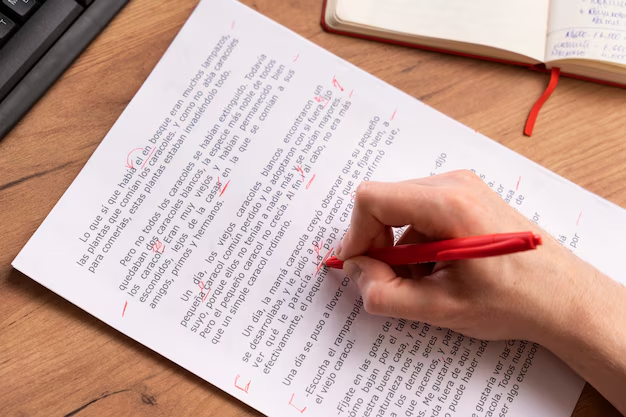Writing is a potent tool in communication and becoming better at it can greatly improve your personal and professional life. Whether you are writing emails, reports, essays or creative pieces; improving your writing ability will make your work more impactful. As someone who has worked as a content developer for six years, I have learnt some useful strategies that may help you to enhance your writing-skills. So why wait? Let us begin!

Strategies to Improve Writing Skills
Read Often and Widely
- Reading is the most important activity when it comes to improving one’s writing-skills. It involves immersing oneself into different styles of writing, types of literature and ways of expressing oneself in order to learn new techniques and develop an ear for language. Below are some instances where reading helps:
- Various Styles: You can be exposed to numerous kinds of prose through reading diverse works including fiction, non-fiction books, newspapers or even online materials.
- Broadening Vocabulary: Meeting fresh words and phrases could also expand your expressions thereby giving you the opportunity to communicate more accurately.
- Structure Comprehension: By reading well-structured pieces, an idea on how thoughts should be organized in order to bring out arguments coherently can be gained.To make the most from your reading exercise try active reading techniques such as spotting powerful passages and reflecting upon what makes them effective by taking notes over them. For me, reading a diverse array of materials, from classic literature to contemporary blogs, has always provided a wealth of inspiration and learning.

Writing regularly
- Like any skill, writing develops with practice. If you can put aside some time writing on a regular basis, it will help you to refine your style and develop the habit of writing consistently. Here are a few suggestions.
- Write Daily: Even if only for a short time, write every day so that your skills don’t get rusty. I started my work as a content developer by committing to at least 500 words per day irrespective of the subject matter.
- Writing Variety: Experiment with different types of writing such as journals, blogs, creative or technical papers. My portfolio comprises everything from technical manuals to engaging blog posts each requiring a unique approach.
- Writing prompts: They are meant to challenge yourself and ignite creativity when used in creative writing. You might be forced to think outside the box using these prompts. I often go through responses to past career prompt as I look into how my answers have changed over time.
Clarity and Brevity
- The effective writer is clear and concise. The message should not confuse or strain readers while trying to comprehend what you intended to say. To achieve this, follow these tips:
- No jargon: Don’t use specialist lingo or buzzwords unless you’re addressing a niche audience that understands them.
- Say it straight: Get straight-to-the-point fast without using unnecessary words or expressions.
- Simplify sentences: Complex ideas can be broken down into simpler and shorter sentences.
- One piece of advice that I always remember is to “write as if explaining to a friend.” This keeps my writing accessible, engaging and easy for anyone to understand.

Understand Your Audience before improving Writing Skills
- Writing specifically for your audience is so important. Different audiences have different needs and expectations. Here’s how to adapt your writing:
- Know Your Audience: Look at who will read your work and what they want. In the beginning of my career I often had to write for different audiences—technical experts or laymen—so altering my tone and content was necessary.
- Adjust Tone and Style: Employ tone and style that are liked by the audience you are addressing. For example, while a business report should be formal, a blog post may take a more conversational approach.
- Use Appropriate Language: Make sure that you use words that will be understood and appreciated by those you are communicating with.
Revise and Edit
- Good writing always involves revision and editing. Revising provides better clarity, refines ideas in first drafts which may not be perfect Here is one way to go about it:
- Take a Break: After completing an initial draft, give it some time before revising it. You can then go back when your mind is clear from all other thoughts
- Read it out loud: Reading your text out loud can help you identify any errors as well as awkward sentences structure.
- Look at the structure: Be sure that your essay has an introduction, body and a conclusion. Also, make sure that each paragraph is logically linked to the next one.
- Edit for Clarity and Brevity: Delete words which are not necessary and ensure that each sentence is clear and short.
- Proofread: Examine the document for grammar, punctuation, and spelling mistakes. Try using utilities like Grammarly or Hemingway to assist
- Stepping back from a piece for a day or two often helps me see areas where I need improvement.
Seek Feedback
- Getting feedback from others can give you an idea of what your writing looks like beyond its author. They will find flaws you overlooked before they were pointed out by anyone else in order to constructively criticize them. Here’s how to seek feedback effectively:
- Peer Review: Share your work with peers or colleagues who can give honest opinions about it.
- Writing-Groups: Join a writing group that reviews each other’s work.
- Professional Feedback: Consider hiring a professional editor or writing coach for more comprehensive comments.
- In my experience, feedback from colleagues has been invaluable. Often, their perspective has helped me see things differently while improving my craft.

Study Grammar and Style
- Study grammar and style to write effectively. Here is how to improve your knowledge.
- Grammar Guides: Use resources such as “The Elements of Style” by Strunk and White or online grammar guides.
- Writing-Courses: Sign up for writing-courses either online or in person to better your grammar and style.
- Practice Exercises: Do grammar exercises to reinforce what you know.
- At the outset of my career, I spent time in studying through a number of guidelines about grammar and style, which has enabled me to build a strong foundation upon them.
Embrace the Writing Process
- Writing is a process that involves planning, drafting, revising, and editing. These steps make it easy for you when writing something.
- See this: Planning: Organize your ideas before you begin writing them. It will help you in organizing your thoughts and give you a clear direction for your work. In most cases, I do draw detailed outlines so that there can be logical flow of ideas.
- Drafting: Just pay attention on getting the thoughts down without considering perfection. The first draft is all about exploration and growth.
- Revising: Improve clarity, coherence, and flow in reworking your draft. That’s where you refine your ideas and structure.
- Editing: Concentrate on grammar, punctuation marks as well as the manner of presentation. This serves as the final polish to guarantee that your writing is free of errors.
Develop a Unique Voice along with Writing Skills
- Your writing voice is your unique style and perspective. It can be more interesting and memorable if you try to establish your own voice. This is how:
- Be Genuine: Write in a manner that feels natural for you. Do not try to copy other people; instead, expose your real self.
- Try everything: Attempt different tones or styles and find out what works best for you.
- Reflect: Think about what makes your writing distinctive and how it can show such features.
- Finding my voice has been a long journey of personal discovery influenced by feedback and reflection.

Which tools can be used to improve Writing Skills?
- There are numerous tools and resources available to assist you enhance your writing. Here are some recommendations:
- Writing-Software: Scrivener, Microsoft Word—these tools enable organization of content as well as formatting.
- Grammar and Style Checkers: Grammarly, Hemingway—these programs aid with grammar correction as well as style improvement.
- Writing-Communities: Wattpad, Scribophile—they provide access to other writers online where one shares their work with others
Conclusion
The journey to improve your writing-skills requires practice, patience and dedication. To improve your writing abilities and create work that connects with your readers, you must read extensively, write often, clarity in focus, know your audience, revise and edit constantly, seek feedback consistently on grammar and style of writing embrace the process of writing develop a distinctive tone and use writing-tools. As a writer remember it is an evolving skill which means the more one writes the better they become.
These strategies have been crucial to my development as a content developer for six years. I hope that you will find them similarly useful in terms of progressing with your own writing career.
Read more:
All about Writing Skills